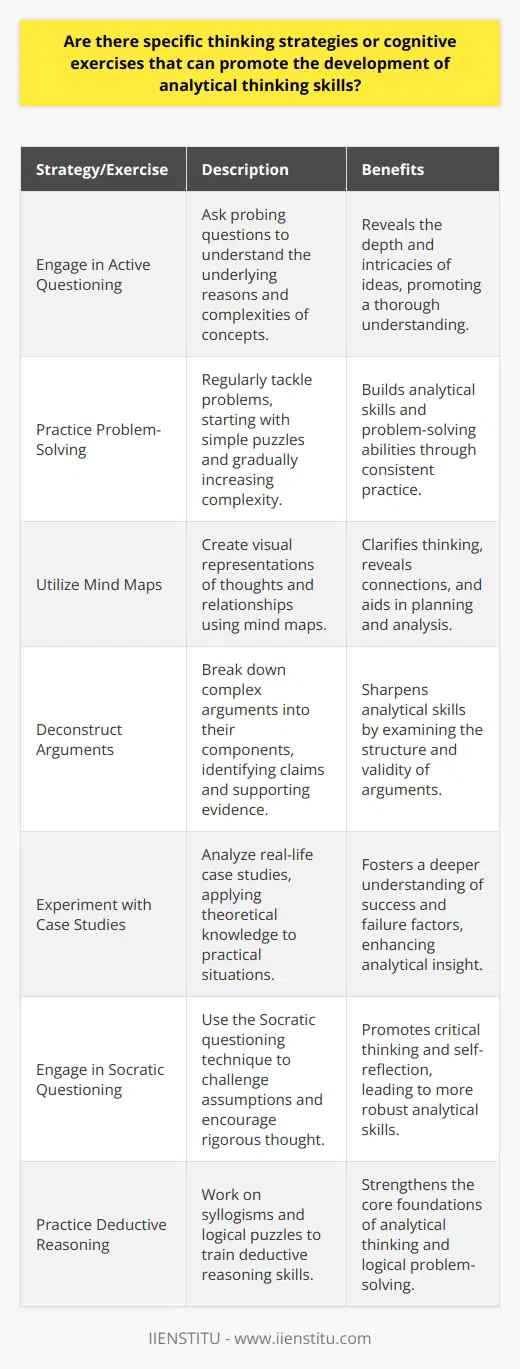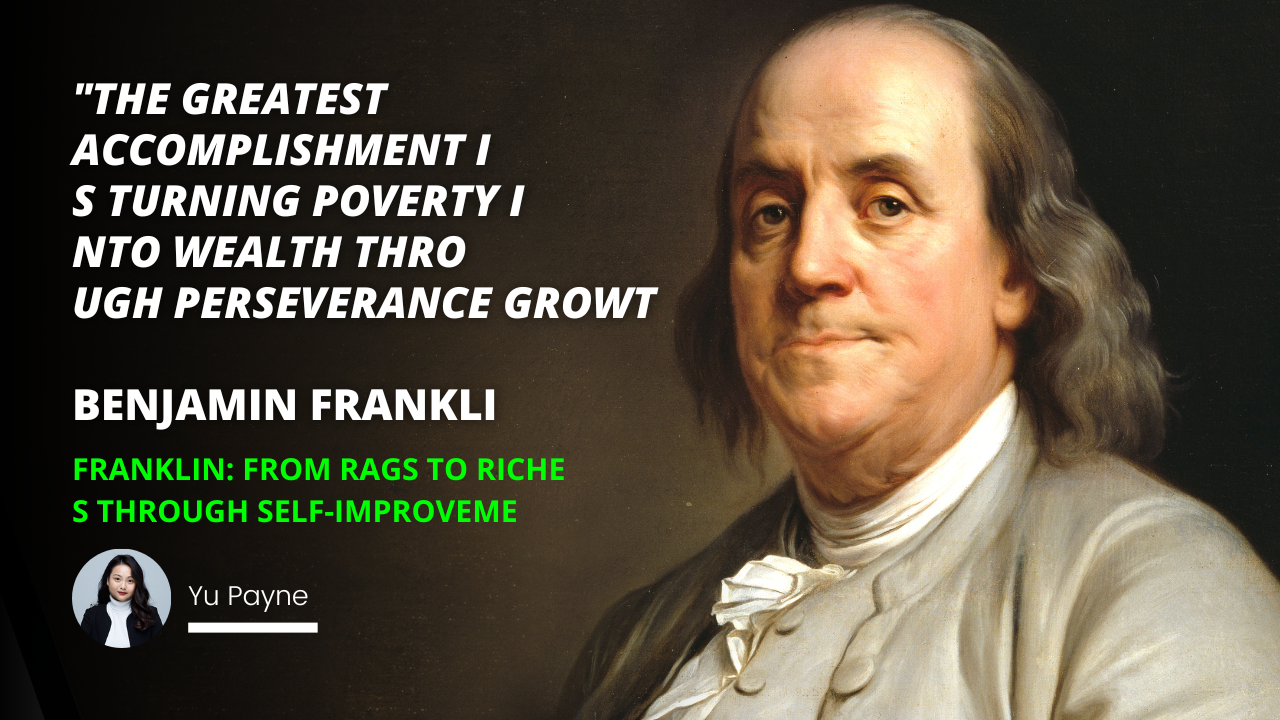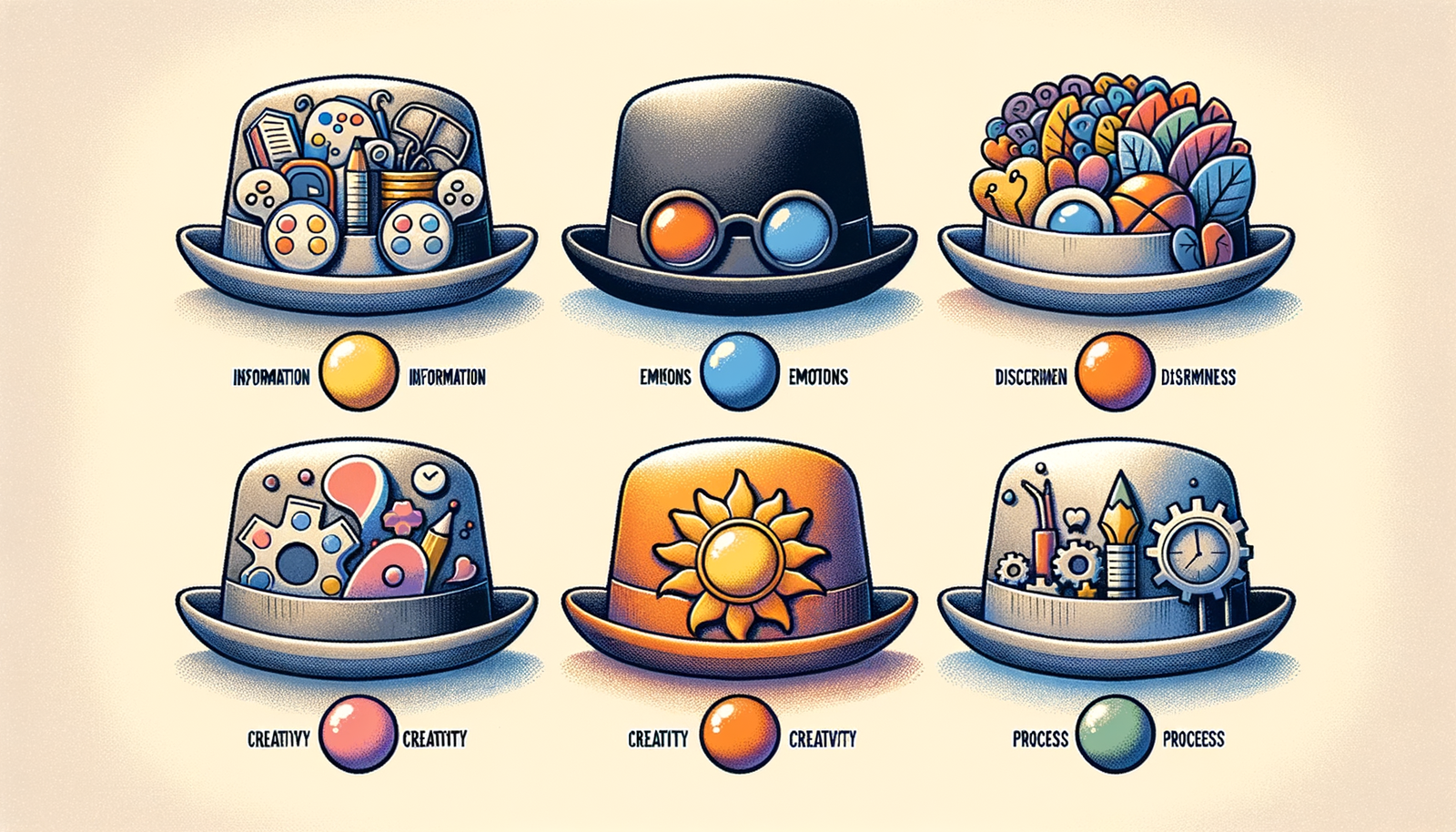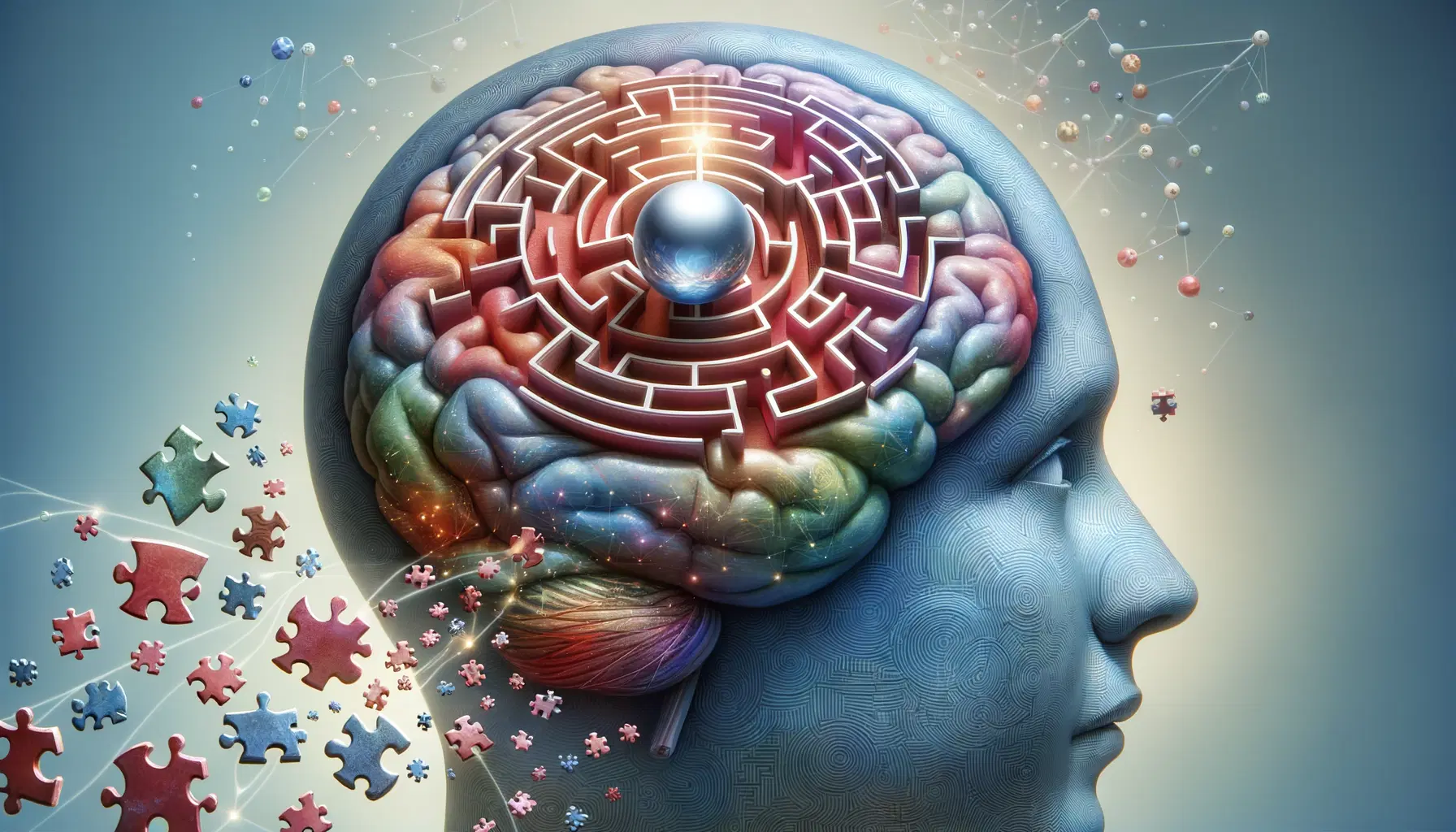
As I sat at my grandmother's kitchen table, watching her tackle the day's crossword puzzle with ease, I was fascinated by her ability to break down complex clues and piece together the answers one by one. Little did I know, she was demonstrating the essence of analytical thinking, a fundamental cognitive skill that allows us to deconstruct intricate information into manageable parts, enabling better understanding, informed decision-making, and effective problem resolution. The importance of analytical thinking in everyday life cannot be overstated, as it empowers us to evaluate situations clearly, recognize potential outcomes, and devise solutions that are not just effective, but often innovative.
Throughout my personal and professional life, I've encountered numerous situations where critical thinking skills and analytical ability were not just beneficial, but essential. Whether it was orchestrating a team project under a tight deadline or navigating unexpected challenges in supply chain logistics, the ability to think critically and analytically made all the difference. Critical thinking, at its core, involves actively analyzing, interpreting, evaluating, and synthesizing information. It's about being curious, questioning assumptions, and not taking information at face value. By honing these skills, we become better equipped to handle the complexities of modern life and work.
One pivotal moment in my career was when our company faced a significant drop in product demand. Instead of seeing it as a setback, our team viewed it as an opportunity to implement the supply chain management process tips we had been discussing but hadn't yet put into practice. We broke down the problem, analyzed each component, and explored various scenarios. This approach not only resolved the immediate issue but also enhanced our overall efficiency, demonstrating how to improve analytical thinking and reasoning skills through real-world application.
Problem-solving skills are intrinsically linked with cognitive development, serving as a powerful vehicle for enhancing one's analytical prowess. By wrestling with problems, we harness our innate cognitive resources to forge new connections and pathways in the brain. Essentially, problem-solving acts as both an exercise and a measure of our analytical thinking, indicating a symbiotic relationship between the two.
To effectively tackle problems, it's crucial to understand the different types we may face:
1- Structured Problems: These have clear steps and known outcomes, such as solving a mathematical equation or following a recipe.
2- Unstructured Problems: These are complex and ambiguous, requiring nuanced approaches, like addressing climate change or improving organizational culture.
Recognizing the critical thinking vs analytical thinking differences is key to selecting the appropriate problem-solving approach. While critical thinking involves evaluating information and questioning assumptions, analytical thinking focuses on breaking down complex issues into smaller, more manageable components.
Classical problem-solving methods, such as hypothesis testing, root cause analysis, and logical deduction, form the foundation upon which analytical skills can be built and refined. These techniques provide a structured approach to tackling challenges, allowing us to systematically identify the root cause of a problem and develop targeted solutions.
One technique I've found invaluable is the 5 Whys root cause analysis method. Let me share an experience: When we noticed a decline in customer satisfaction scores, we employed the 5 Whys to uncover the underlying issue:
1- Why were scores declining? Because customers reported slow response times.
2- Why were response times slow? Due to increased call volumes.
3- Why was there an increase in calls? Our latest software update caused confusion.
4- Why did the update cause confusion? The user interface had changed significantly.
5- Why was the interface changed? We didn't conduct sufficient user testing.
By peeling back the layers, we identified the root cause and implemented targeted solutions, such as improving user testing processes. This example illustrates the steps to develop strong problem-solving skills through the application of a structured approach.
Another powerful tool is the Fishbone Diagram, also known as the Ishikawa diagram, which helps in identifying multiple potential causes of a problem and categorizing them to systematically find the root cause. This fishbone diagram root cause analysis template provides a visual representation of the factors contributing to a problem, making it easier to identify areas for improvement.
While structured problem-solving techniques are essential, it's equally important to cultivate creative problem-solving skills to tackle unstructured problems effectively. Creative problem-solving techniques for unstructured problems include brainstorming, lateral thinking, and mind mapping. These approaches encourage us to think outside the box and generate innovative solutions to complex challenges.
During a project aimed at reducing waste in our production process, our team employed mind mapping for effective problem-solving and innovation. We visually laid out every step of the process, identified bottlenecks, and brainstormed creative solutions. This exercise not only helped us reduce waste but also sparked ideas for new products, demonstrating the power of integrating creative and analytical thinking.
The true challenge lies in marrying creativity with analytical rigor. Edward de Bono's Six Thinking Hats methodology provides a framework for considering problems from multiple perspectives:
1- White Hat: Facts and information
2- Red Hat: Emotions and feelings
3- Black Hat: Critical judgment
4- Yellow Hat: Optimism and benefits
5- Green Hat: Creativity and new ideas
6- Blue Hat: Process control
By consciously switching "hats," we ensure that all aspects of a problem are considered, leading to balanced and effective solutions (De Bono, 1985).
Cultivating a problem-solving mindset is crucial for personal and professional growth. This involves seeing challenges as opportunities for learning and development, staying curious, embracing failure as a stepping stone to success, and regularly engaging in activities that challenge the brain. By reflecting on problems daily and considering multiple solutions, we strengthen our critical thinking skills and enhance our ability to navigate complex situations.
Integrating problem-solving techniques into everyday life, such as budgeting, trip planning, and negotiations, allows us to continuously refine our analytical thinking abilities. As Stephen Covey emphasizes in his book, "The 7 Habits of Highly Effective People," proactively addressing challenges and seeking win-win solutions is a hallmark of personal and professional effectiveness (Covey, 2004).
Developing robust analytical and problem-solving skills is a journey that requires patience, practice, and persistence. By embracing both structured vs unstructured problem-solving approaches and cultivating a growth mindset, we pave the way for continuous learning and advancement. Like my grandmother with her crossword puzzles, it's about taking one clue at a time, thinking it through, and enjoying the process of discovery.
Building a problem-solving mindset for career growth involves recognizing the value of analytical thinking and actively seeking opportunities to apply these skills in real-world situations. By leveraging tools like the 5 Whys, Fishbone Diagrams, and creative problem-solving techniques, we can systematically tackle challenges, drive innovation, and position ourselves for success in an ever-changing landscape.
As Richard Paul and Linda Elder emphasize in their book, "Critical Thinking: Tools for Taking Charge of Your Professional and Personal Life," developing strong critical thinking skills is essential for making sound decisions, solving problems effectively, and leading a more fulfilling life (Paul & Elder, 2002). By embracing the importance of analytical thinking and continuously refining our problem-solving abilities, we unlock our full potential and navigate the complexities of the world with greater ease and confidence.
In conclusion, the journey towards enhanced analytical thinking and problem-solving skills is one of continuous growth and discovery. By embracing the techniques and mindset discussed in this article, we equip ourselves with the tools necessary to tackle challenges head-on, drive innovation, and thrive in both our personal and professional lives. As we continue to develop these critical skills, we not only enhance our own cognitive abilities but also contribute to the collective knowledge and progress of our communities and organizations.
References:
Covey, S. R. (2004). The 7 Habits of Highly Effective People. Free Press.
De Bono, E. (1985). Six Thinking Hats. Little, Brown and Company.
Ishikawa, K. (1986). Guide to Quality Control. Asian Productivity Organization.
Paul, R., & Elder, L. (2002). Critical Thinking: Tools for Taking Charge of Your Professional and Personal Life. Financial Times Prentice Hall.
Frequently Asked Questions
What constitutes an effective problem-solving technique to improve analytical thinking?
Defining the Effective Technique for Problem Solving
An effective problem-solving technique is key. It sharpens analytical thinking. To tackle complex problems, such strategy involves systematic methods. These methods should focus on critical thinking skills.
Develop Comprehensive Understanding
First, one must understand the problem deeply. Use questioning tactics. Ask what, why, how, and when. These simple interrogations clarify issues. They simplify complexities. This approach fosters comprehensive comprehension.
Break Down the Problem
Next, deconstruct the problem. Isolate components carefully. Recognize each part’s function. Small, manageable pieces are easier to solve. This segmentation makes analysis less daunting.
Generate Multiple Solutions
Brainstorm diverse solutions. Encourage creativity. Think outside the box. Quantity matters here over quality. More options increase chances of efficacy. This process inspires innovative thinking.
Evaluate Solutions Rigorously
Now, sift through options. Assess feasibility and impact. Pros and cons are essential. Prioritize unforeseen consequences. This step demands critical evaluation. Done correctly, optimal solutions emerge.
Implement with Adaptability
Choose a solution. Execute it flexibly. Monitor closely for effectiveness. Adapt as necessary. Flexibility ensures adaptability to changing circumstances. Real-world application often requires such agility.
Reflect on the Outcome
Reflection completes the cycle. Review the process. Identify strengths and weaknesses. Learn from successes and failures. This reflection solidifies the learning experience. Such analysis promotes skill enhancement.
Foster Continuous Improvement
Repeat these steps often. Practice hones problem-solving abilities. Each repetition can refine techniques. Continuous improvement remains the ultimate goal. This dedication to growth ensures enduring analytical acumen.
To sum up, an effective problem-solving approach requires understanding, deconstruction, brainstorming, rigorous evaluation, adaptable implementation, and reflective practice. Employing this strategy consistently enhances analytical capacities.
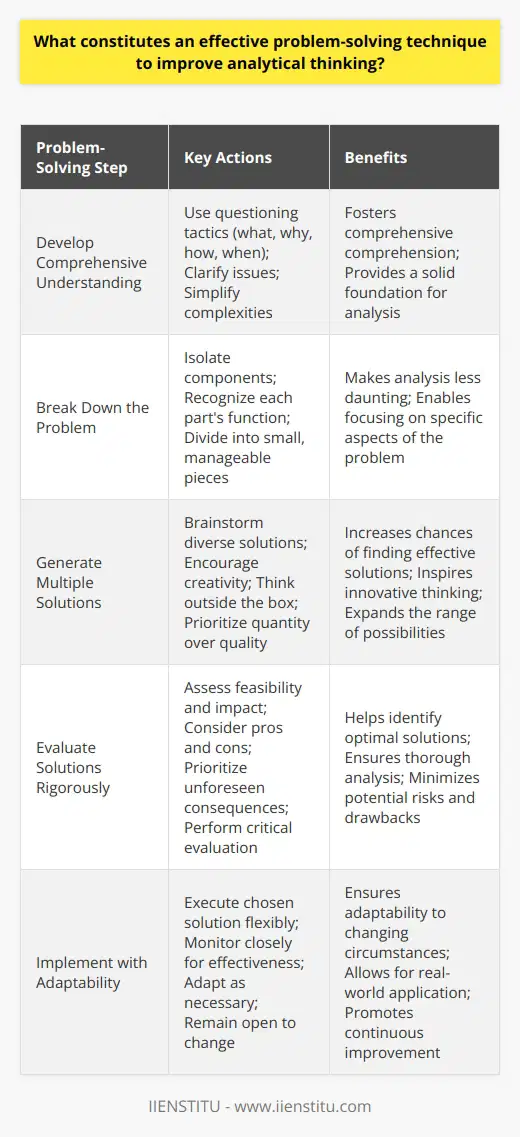
How can applying analytical thinking to problem-solving influence decision-making processes?
Analytical Thinking Enhances Decision-Making
Analytical thinking fundamentally transforms decision-making. It injects clarity and precision into the process. Decision makers employ logic and reasoning. They analyze information systematically. Patterns emerge. Trends become visible. This structured scrutiny eliminates confusion. It helps focus on relevant data only. Decision quality improves as a result.
Critical Components of Analytical Thinking
Objective evaluation stands out. It requires dispassionate analysis. Subjective feelings and biases recede. Facts guide decisions. Clear objectives are set. Goals steer the decision-making process. This approach ensures alignment with desired outcomes.
Data collection becomes a crucial step. Varied sources provide information. Reliability and validity are paramount. Irrelevant data gets discarded. This streamlines the thought process.
Assumption questioning is another key aspect. Analytical thinkers challenge existing beliefs. They scrutinize the status quo. New possibilities come to light. Innovation can ensue.
Pattern recognition plays a vital role. Analysts seek out connections. They identify cause-effect relationships. This enables them to predict outcomes.
Critical analysis leads to better solutions. Complex problems are broken down. Simpler components allow for manageable interventions. Decision makers can tackle issues effectively.
The Impact on Decision-Making
Analytical thinking brings numerous benefits. It makes processes more robust. Decisions stand on solid ground. Risks are assessed methodically. Opportunities are evaluated carefully. Analytical methods breed confidence. Decision makers can justify their choices.
Other impacts include:
- Greater efficiency
- More strategic thinking
- Enhanced problem-solving
- Fewer mistakes
Analytical thinking fosters continuous improvement. The decision-making process evolves. It becomes more sophisticated over time. Learning is integral to this evolution. Each decision informs the next. Innovation thrives in such an environment.
Applying analytical thinking to problem-solving shapes decision-making. It brings structure and rigor. Decisions become more effective and efficient. Analytical thinkers make well-informed choices. They optimize outcomes. Businesses benefit from their sharp problem-solving skills. In essence, analytical thinking unlocks better decision-making.
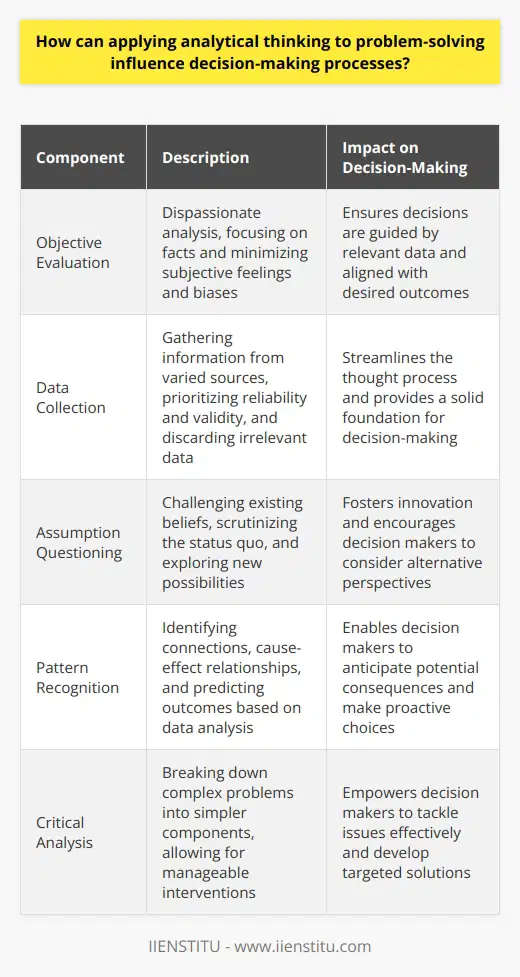
Are there specific thinking strategies or cognitive exercises that can promote the development of analytical thinking skills?
Understanding Analytical Thinking
Analytical thinking involves examining complex concepts methodically. It enables deeper understanding. This skill is essential across various disciplines.
Strategies to Foster Analytical Skills
Engage in Active Questioning
Questioning underpins analytical thinking. Don't just accept facts. Ask why things happen. What are the underlying reasons? Seek the how and the why. Posing questions reveals complexities.
Practice Problem-Solving
Regularly tackle problems. Start with simple puzzles. Gradually increase complexity. Every challenge builds analytical muscle.
Utilize Mind Maps
Mind maps clarify thoughts. They show relationships visually. Connections become apparent. They are effective for planning and analysis.
Read Actively
Don't read passively. Engage with the material. Look for underlying assumptions. Identify the author's biases. Reflect on alternative perspectives. Write summaries.
Write Analytically
Writing enhances clarity. It demands organized thought. Analyze a topic and write. Develop arguments. Support them with evidence. Anticipate counterarguments.
Deconstruct Arguments
Break down complex arguments. Understand their components. What are the claims? What evidence supports them? This process sharpens analysis.
Play Strategic Games
Games like chess require foresight. They improve strategic thinking. Players must analyze consequences. They must predict opponent moves.
Learn Programming
Coding is logical. It strengthens problem-solving skills. Algorithms embody analytical thinking. Debugging promotes attention to detail.
Experiment with Case Studies
Analyzing case studies fosters understanding. It applies theory to real life. Identifying success and failure factors is key. Comparison of cases deepens insight.
Regularly Reflect
Reflection is powerful. It internalizes learning. After an activity, reflect. What worked? What did not? Adjust strategies accordingly.
Cognitive Exercises to Boost Analytical Thinking
Brain Teasers and Puzzles
Engage with riddles and brainteasers. They train logical reasoning. Complex puzzles like crosswords help.
Socratic Questioning
Use this technique for deep inquiry. Challenge all assumptions. It encourages rigorous thought. Reflect on answers critically.
Deductive Reasoning Practice
Work on syllogisms and logical puzzles. They train deductive reasoning. Deductive thinking is core to analytics.
Critical Reading Exercises
Analyze texts closely. Dissect arguments. Examine structure. Determine the strength of evidence. Such exercises hone critical reading.
Data Analysis Tasks
Manipulate and interpret data. Use spreadsheets or databases. Look for patterns. Make inferences. Data handling is analytical.
Developing analytical skills requires discipline. Practice regularly. Employ diverse methods. Challenge yourself. Increase complexity over time. This structured approach yields results. Your analytical abilities will grow.
